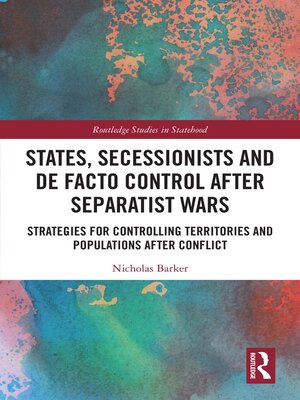States, Secessionists and De Facto Control after Separatist Wars
ebook ∣ Strategies for Controlling Territories and Populations after Conflict · Routledge Studies in Statehood
By Nicholas Barker

Sign up to save your library
With an OverDrive account, you can save your favorite libraries for at-a-glance information about availability. Find out more about OverDrive accounts.
Find this title in Libby, the library reading app by OverDrive.



Search for a digital library with this title
Title found at these libraries:
| Library Name | Distance |
|---|---|
| Loading... |
This book investigates how states and secessionists seek to resolve questions of de facto control in the aftermath of secessionist wars.
This work presents a study of the termination and aftermath of separatist wars, using two in-depth case studies – the Georgia-Abkhazia conflict (1994-2006) and the Serbia-Kosovo conflict (1999-2008) – to develop an empirically grounded theoretical framework to explain state and secessionist strategies for controlling territory and populations in post-war environments. It draws on fieldwork and archival research carried out in Georgia, Abkhazia, Serbia, Kosovo, and the UN archives and presents further evidence to develop and extend the framework using 'shadow cases' of the separatist wars in the Caucasus and the Balkans. By focusing on actors' objectives and their strategies for controlling territory and populations within the constraints and opportunities of a post-war context, this study helps explain what states and secessionists do and why in the critical period after a war ends and helps inform understanding of the formation and trajectories of post-war orders. This study has relevance for international policymakers, with reflections on how the theoretical framework may facilitate conflict analysis and inform policy responses towards protracted armed conflict.
This book will be of interest to students of statehood, intra-state conflict and civil wars, international security, and International Relations in general.







